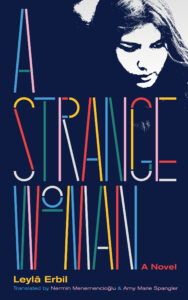
[Deep Vellum Publishing; 2020]
Tr. From the Turkish by Nermin Menemencioğlu and Amy Marie Spangler
The opening of Nermin Menemencioğlu and Amy Marie Spangler’s translation of A Strange Woman by Leylâ Erbil (due out in March 2022) sets the stage for a novel that plays with the limits of comprehension and communication. Having the opportunity to share her work with a greatly admired poet, the central daughter Nermin finds that even the ever-expansive nature of language is limited by readers seeking a singular interpretation. Her poems invoke narrow-eyed confusion in the poet, who questions whether or not the descriptions in the poems are her own authentic experiences. Her final poem, meant to describe the anxiety of her first catamenia, invokes the poet’s perplexity at the exact nature of the blood described and his assertion that Nermin is too young to write poetry. He says he’ll bring some books for her to read and to “keep writing, writing, writing, then ball it up and throw it all into the corner, but never stop.” Of course, when she picks up the books she finds that she’s already read them all.
When Leylâ Erbil’s A Strange Woman first came out in 1971, titled Tuhaf Bir Kadın in its first Turkish iteration, it was part of an influx of feminist texts by contemporary Turkish women writers who transformed the literary landscape. While the number of women novelists and poets had seen an increase after 1923 compared to the numbers during the Ottoman Empire, the post-war period saw a boom in women expressing not only their rights to write, but their rights to experimentation and investigation of interpretation. The postmodern forms of the novel find various folds and representations in the novels by contemporary women writers in Turkey, ranging from the magical realism and linguistic exploration of Latife Tekin to the haunting fables of Nazh Eray.
In an essay titled “The Woman in the Darkroom: Contemporary Women Writers in Turkey,” author Güneli Gün speculates that the prominence of women writers in Turkey’s avant-garde may be in one part due to “women [having] things to say that have never been said before, and to do it, they must bravely transform old repressions into powerhouses of language. Second, since the serious fiction of the sixties, and before, belonged to men, women writers have nothing to lose in experimenting with postmodernist forms.” What makes Leyla Erbil’s A Strange Woman stand out amongst the cacophony of literary experimentation is the novel’s actualization of its own linguistic exploration not only in form but in content as well. While the main perspective of the novel is that of Bayan Nermin, Part II folds back onto her father’s life as he loses his grip on life. As literary daughters take up the mantle, the father in Erbil’s own novel flounders in his final days as he looks back upon his life in a country he no longer recognizes.
The Communist Party of Turkey, Türkiye Komünist Partisi, was founded in 1920, predating the creation of the Turkish republic by three years. Its founder Mustafa Suphi was assassinated in 1921 and never lived to see one of his alleged murderers establish himself as the first president of a new republic. The TKP would be banned and driven underground, but found a resurgence in the 60s and 70s after the Workers Party of Turkey, Türkiye İşçi Partisi, was also banned and its members, pushed underground, would converge with the TKP. Nermin falls into the chapter of the resurgence, fervently defending communism and the people, while her father was there for its inception, finding himself now confronted with a people he no longer recognizes, though were they ever recognized? In the father’s recollection of his sea-faring days, the question of who killed Mustafa Suphi hangs like a fog.
The investigation of not only a generational transformation but a gendered one results in a multi-vocal novel, weaving together attempts at communication that come apart at the seams of interpretation. After the death of the father, the novel remains splintered between Part III “The Mother” and Part IV “The Woman.” In the beginning there is the impression of a beginning, a middle, and an end to come. But after the second section there is a fork in the road, the mother and the woman coexisting. And just as there seems to be a glimmer of understanding between the various existences, the text retreats back into Nermin, circling her own repeated attempts at communication and understanding.
Menemencioğlu and Spangler’s translation is an intricate one, for A Strange Woman, despite its seemingly prosaic form, weaves poetry amongst its lines. The first section especially, which comes in the form of the daughter Nermin’s diary, is filled with lines that are simultaneously rushed and lethargic. Occasionally her own poems find representation in the text, as does the poetry of others. And while the reader is told at the opening of the section that the diary comprises two years worth of memories, there is no temporal breakup in the lines. The reader realizes only at the end of the first section, when Nermin refers to herself as “a girl of nineteen,” that she must have been seventeen when the novel began. Moments are distinguished only by virtue of their linear progression and impossibility of simultaneity. As a result, the passage of time is liminal, a monologue given as the reader holds their breath.
The second section “The Father” finds its harmony in songs, though by the magic of verbal representation, poetry and song are indistinguishable. There is an ethereal quality to the first two sections, both of the world and untethered from it. The second section follows the father primarily, for with every rebirth a death must occur, a cycle eternally repeating. The father fades back and forth between the present and the past, his fall and rise. The daughter arrives in the world as the father departs from it, though in their respective passages they see each other, find each other as two ships in the night, without ever truly knowing the other. It’s unclear if Nermin even knows of her father’s past, tied inextricably with communism.
Alongside politics, faith is another field of combat between Nermin and her family, and while the tension between the various sections is never truly resolved, they coexist by virtue of living in the same world. Even in her father’s final days the instigation persists. He asks his daughter whether or not Allah exists, a discussion they have had many times, pretending to be angry that she won’t indulge a man on his deathbed.
‘You know what I think,’ [Nermin said to her father], with a kick of the hind legs, ‘there’s no Allah, dad, there are only the exploited and the exploiters.’ Hey, look at this girl, she knows her father’s on the brink of death, but will she admit to the existence of Allah, even if only to make him happy before he dies?
A Strange Woman tells of a woman’s love affair with life, though it is a life that existed before her and will exist long after. The question becomes what will be done with that love in the meantime. Love appears in multiple forms, indiscreet and discreet, indecent and decent, wanted and unwanted. There is a frankness in the text’s testimony which, like the main character, doesn’t seek to make judgements or proclamations upon others. A witness, rather than a mere bystander.
The text is deeply funny, using humor to deconstruct the distance between opposing viewpoints, with a humor that is dark and hysterical. One could think of the original feminine hysteria, distorting coherence, underlined by ambiguity, for isn’t that the nature of comedy itself? In the final section, leaving the bourgeois city for a village to be closer to the true working people, Nermin drags a grand piano with her that won’t fit into the entrance of her new home. Reminding herself “Anything for the people”, the piano is installed under a plum tree in the yard, where she croons over to the children and the adults to come learn of the wondrous instrument.
With her genial naiveté, Nermin becomes a manifestation of the title. The “strange” in A Strange Woman from the word “tuhaf” comes with connotations of the ridiculous and the bizarre. Nemin’s eccentricity defies convention and while she has always revealed herself to be unrestrained by the demands of coherence, there is a lingering doubt that hangs over the final section. An uncertainty in the face of uncertainty. Nemin’s strangeness does not necessarily have the power alone to upheave the system, but it operates as a reflection of the system’s own absurdity and malleability. Her strangeness finds representation in the translation itself, with its insertions of poetry and song, an expression of language that doesn’t find itself beholden to limitations. Throughout the text, Nermin pushes against love and revolution just as the text pushes against the manifestations of realism. Expectations are set aside in favor of an investigation, with metaphors overtaking the description and blurring the “reality” of the scene. And just as love and revolution are both endless processes that find fruition in engagement, verbal representation tumbles its way through prose and poetry. The reader experiences this engagement through the layer of translation, amongst languages and between them, an expansive approximation and renegotiation. Menemencioğlu and Spangler’s lines request multiple readings, not so much for slowing down the reading as for sharpening the lens on an image that refuses to focus. As a result, there is a ghostly feeling in the lines, the haunting possibility of more.
Readers do not get to enjoy all of Nermin’s written lines from her initial encounter with the poet. They are invited to share in a larger portion of her menstruatative piece, though it is unclear if it is a fragment or the whole:
Is this the heel of mighty Achilles
pierced in my very bed,
or some great gaping wound
where eagles have collided in the sky?
Ceaseless, the blood
out of the pain within her lungs
drowning eyes, wrists
drowning the sea beneath its chains
ceaselessly drowning.
Whether or not Nermin continues to write is unclear, though there are no more pieces shared with the reader. Instead, she is seen focusing her poetry on her love of the people, though even this poetry finds itself fraught with miscommunication. There is breathtaking strength in Nermin’s perseverance as she strives to navigate in a world remaking itself, and while the text hints at a feeling of a coming-of-age novel there is a sense of an age eternally yet to come. And it is with this sense of potential that Nermin’s final question, to herself, to the reader, echoes in the air long after the text’s completion.
Marina Manoukian is a reader, writer, and collage artist. A contributor to Pussy Magic, she received her M.A. in English Philology from Freie Universität Berlin. Find more of her words and images at marinamanoukian.com or twitter/insta @crimeiscommon.
This post may contain affiliate links.







